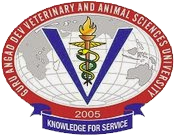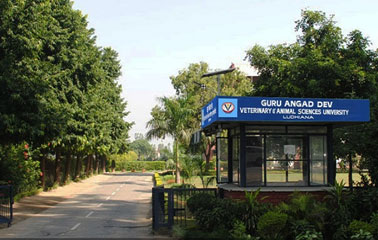

Kandi area which is located in the foothills of Shivalik is the most economically backward region of the state. The major problems faced by the farmers of the kandi area are the lac of irrigation facilities, erratic distribution of rainfall, small land holdings, heavy soil erosion, declining soil fertility and frequent crop failures resulting in scarcity of feed, fodder and fuel. Because of these limitations, it has not been possible to improve the livelihood of the farmers by increased crop productivity as has been achieved in the rest of the state. However, livestock farming with improved productivity can serve as additional source of economic development in this region since it has better scope and viability with proper input services. Dr V.K.Taneja, Vice-Chancellor, Guru Angad Dev Veterinary and Animal Sciences University, Ludhiana expressed these views while inaugurating the first Pashu Palan/Kheti Mela organized by GADVASU at village Bhatoli where the University is going to establish a Regional Livestock and Poultry Research and Training Centre. He hoped that with the development and dissemination of the area specific technologies related to livestock farming, this area will usher in a new era of livestock development and the livestock farmers of the kandi area will be able to enjoy the benefits of new technologies in livestock farming and the new centre of the University being established at village Bhatoli will meet the aspirations of the people of the area. He hopped that the technologies developed at the new centre being established in kandi area of the Punjab will be equally useful to the farmers of the kandi area of the adjoining state of Himachal Pradesh also. Dr O.S.Parmar, Director of Extension Education, GADVASU, Ludhiana elaborated the various schemes and programmes which will be run at the Regional Research and Training Centre for the benefit of the farmers. These programmes include propagation and distribution of the germplasm of Nili Ravi buffaloes, Jersey crossbred cow, Beetal Goats, Fishery and Poultry. The University will establish research, demonstration and training farms of these animals and the training programmes pertaining to different livestock farm enterprises will be offered from this centre for the benefit of the local youth and young entrepreneurs. Special attention will be given to the training of the farm-women and other weaker sections of society. The major thrust of these programmes to be undertaken at this centre will include the development of superior germplasm, feeding programmes using the local feed and fodder resources particularly suitable to the farmers having small land holdings, development of veterinary health programmes by using the local herbal products and to develop organic livestock farming system. The University is already running, “Sustainable Livestock Based Farming System for Livelihood Security for Hoshiarpur District of Punjab”, a research project funded by the Govt. of India under NAIP. This project is in operation for the last one year. This project is covering 800 families of 4 blocks namely, Dasuya, Bhunga, Hajipur and Talwara with 20-25 families from each of 8 villages of each block. This project is being implemented with the assistance of other co-partners which include the Punjab Agricultural University, Dairy Development Department and the Unati Cooperative and Processing Society, Talwara. Under this project, it is envisaged to improve the livelihood of adopted families by providing them material as well as knowledge support as per the professional preferences of the adopted families which include animal husbandry, agriculture, horticulture, cultivation of medicinal plants, etc.. Dr A.L.Saini who is the Principal Investigator of this project informed that after the launch of this project, 19 NAIP Welfare Camps have already been organized in different villages. A large number of animals were treated in these camps and the feed and fodder samples were tested for quality parameters. The farmers were supplied seeds of improved varieties of crops, fodder crops and kits of vegetable seeds, nursery plantation of medicinal plants, fruit trees and superior germplam of animals in the form of semen and goat bucks for genetic improvement. In addition to this, mineral mixture and Urominlick bricks were also supplied to the cover mineral and protein deficiencies. For wider exposure of the farmers, 7 guided visits of the farmers and the farm-women were conducted to various Kisan Melas/Pashu Palan Melas and Dairy Shows organized by GADVASU, Ludhiana, PAU, Ludhiana and at other places. For the systematic delivery of input services and marketing of their products, self help groups have been developed for different enterprises.
All these efforts have brought a sea change in the mind set of the farmers and more and more farmers are coming forward to adopt the new technologies of agriculture and livestock farming. This has resulted in significant improvement in the productivity of the livestock and agriculture leading to improvement in socio-economic status of the beneficiary families. It is hoped that on the completion of this project, the University will be able to develop a model for the improvement of livestock, agriculture and socio-economic development of kandi area. In this mela, a large number of farmers from the kandi area visited the exhibitions organized by GADVASU, Ludhiana, PAU, discussed their problems. The farm women evinced keen interest in the stalls put up by the Home Science Experts. The Health Check-up Camp was also organized by Guru Nanak Society, Talwara.Dr. S.C. Sharma Director KVK Ballowal Saunkhri, Dr.A.L.Saini Principal Investigator NAIP, Sh. Inderjit Singh Director Dairy Development Board Punjab, Shri Kamal Nain Swami, Unnati Co-operative Society, Dr. R.S. Sahota, Dr. V.K. Randhawa, Dr. S. Sehaj Pal and Dr. R.S. Grewal also addressed the audience. Dr. H.K. Verma, Head Extension Department proposed the vote of thanks.
